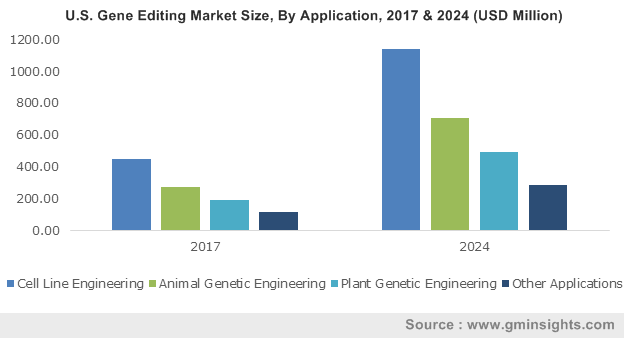U.S. gene editing industry to witness a massive growth over 2016-2024, CRISPR/CAS9 to be the fastest-growing technology segment
Publisher : Fractovia | Published Date : 2017-06-01Request Sample
High incidences of genetic disorders, cancers, & contagious ailments along with rising need for personalized medication will spur Gene editing market expansion. This technology is being increasingly experimented with, subject to the increasing demand for DNA insertion or replacement in the genome of living organisms. On the 22nd May 2017, Horizon Discovery, a leading gene editing organization based in Cambridge, had introduced a new gene editing technology that can generate further the growth prospects for this industry. Enhanced healthcare facilities and the escalating popularity of synthetic gene therapy will also augment gene editing market growth. Furthermore, the rising need of genetically altered crops and high R&D funding by biotech & pharmaceuticals firms will unveil lucrative growth avenues for the business. A report by Global Market Insights, Inc., states that gene editing industry, which is projected to hit a revenue of USD 7.5 billion by 2024, will grow at a rate of 14.9% over 2016-2024.
Gene editing is widely used in the treatment of muscular disorders, hematology, oncology, and infectious diseases. Gene editing industry revenue across hematology sector, worth USD 807 million in 2015, is slated to witness a high surge over the years to come. Widespread usage of gene editing technology to detect gene functionality in hematology will push the growth.
U.S. Gene Editing Market Size, by Application, 2013- 2024 (USD Million)

Gene editing market in the infectious disease segment is anticipated to surpass a revenue of USD 2.5 billion by 2024, growing at a CAGR of 15.2% over the coming seven years. The growth can be credited to the rising application of gene editing technologies for diagnosing infections such as HIV. Oncology applications are predicted to contribute more than USD 874 million towards gene editing market value, registering significant gains of 15.9% over the coming timeframe. The expansion can be attributed to the rising occurrence of cancer, which is the vital cause of death worldwide.
Taking into consideration the geographical trends, U.S. gene editing industry share, estimated at USD 518.5 million in 2015, is anticipated to observe a massive surge over the coming seven years. Mounting frequency of cancer, Alzheimer’s, Parkinson’s disease, and other disorders in the U.S. and the adoption of novel gene-editing techniques such as CRISPR to treat these ailments will boost the revenue. Technological breakthroughs in pharmaceutical and biotechnology sectors will further impel the market growth.
Japan gene editing market, which accumulated a revenue of more than USD 160 million in 2015, is forecast to record notable gains of 15% over the coming timeframe. The development can be accredited to factors such as rising old age population susceptible to genetic diseases, enhanced healthcare amenities, new discoveries in biotechnology, and favorable healthcare policies. Gene editing industry in China will experience a strong development during the period from 2016 to 2024, subject to the large presence of biotech firms involved in life science research coupled with the growing number of research activities.
South Africa gene editing industry, which contributed to over 15% of MEA gene editing market revenue in 2015, is projected to experience a noteworthy expansion over the next few years. The development can be attributed to the high occurrence of HIV disease, hemophilia, sickle cell anemia, and varied cancers.
UK gene editing market, which accounted for more than 41% of Europe gene editing market share in terms of revenue in 2015, is set to reach USD 744 million by 2024. It is projected to grow at a rate of 14.9% over the period of 2016-2024, subject to the high prevalence of chronic ailments across the region.
Based on the technology trends, gene editing industry is classified into TALENS, CRISPR/Cas9, Meganucleases, and Zinc Finger Nucleases. Gene editing market from CRISPR/Cas9 technology is projected to accrue a revenue of more than USD 3 billion by 2024, driven by its extensive application across genetic engineering and farming sectors. Also, this technology was approved by the U.S. government authorities for conducting clinical trials on human beings to cure certain kinds of cancers such as sarcoma, myeloma, and melanoma. TALENS technology is expected to record a CAGR of 15.2% over the years ahead and is likely to boost gene editing industry size.
Biotech & pharma firms, research institutions, and CRO (Contract Research Organizations) are few of the major end-users of gene editing market. Biotech & pharma firms, both of which contributed a revenue of more than USD 1278 million to gene editing industry in 2015, are slated to make substantial contributions towards the industry size over the next few years. The huge surge can be credited to varied applications of gene editing technology in medicine discovery, genome engineering, and therapeutics. Growing preference among the pharmaceutical firms to outsource complicated drug discovery procedures to contract research organizations will boost the business.
Market players are focusing on the development of novel genetic engineering techniques to raise their ROIs via high capital investments in CRISPR & ZFN technological research activities, mergers & acquisitions, and strategic alliances. New England Biolabs Incorporation, Recombinetics Incorporation, CRISPR Therapeutics Limited, GeneCopoeia Incorporation, Innovative Genomics Institute, Agilent Technologies, Bio Rad Laboratories, Qiagen, Lonza Group, Allele Biotechnology, Caribou Biosciences Incorporation, Precision Biosciences Incorporation, Editas Medicine, AstraZeneca PLC, GenScript Biotech Corporation, Cellectis, GE Dharmacon, Merck Millipore, Sigma-Aldrich Corporation, Calyxt Incorporation, and Thermo Fisher Scientific are the key participants of gene editing industry.